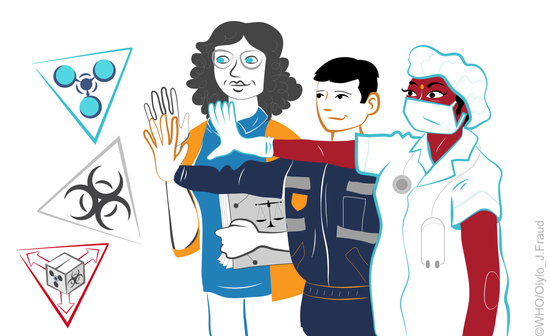
When a deliberate use of chemical or biological agents against a human population occurs, health care professionals and public health personnel are directly involved in the response's organization, management, and implementation. They have an essential role at many levels in allowing rapid detection, adequate management, and limitation of the health impact of chemical or biological deliberate events, or "CBDE". This 3-hour course aims to provide them with basic training on managing and responding to a CBDE by looking at it from a health first-responder angle. It is complementary to the CBDE Level 1 and Level 3 courses but can also be taken independently.
Please note: These materials were launched on 04/11/2022.
Язык: English
English
Health topic
Информация о курсе
Overview: Health care professionals are certain to be among the key personnel in responding to a deliberate use of chemical or biological agents against a human population. It is consequently vitally necessary that those personnel who may be affected by such use gain a basic understanding of their nature and of the principles of how to respond. Similarly, a chemical or biological deliberate event, or “CBDE” for short, would place exceptional strain on the public health sector; thus, public health personnel also need to have a basic understanding of how to manage an effective public health response to CBDE. As the United Nations’ public health agency, WHO has an important role to play in the global public health response to, preparedness and readiness for events involving possible deliberate use of biological and chemical hazards. That is why the Biosecurity and Health Security Protection Unit has developed this online training on basic knowledge in managing the consequences of a Chemical and Biological Deliberate Event for all health professionals worldwide. The course comprises an introduction, four modules and a final evaluation covering an overview of how to manage the consequences of a Chemical and Biological Deliberate Event as an health professional.
Learning objectives:
By the end of this course, you will:
- Recognise the nature of a deliberate event (vs. a natural or accidental one),
- Detect and manage it at first-responder level,
- Classify and distinguish chemical and biological agents and their routes of exposure,
- Describe the legal framework on Chemical and Biological Warfare,
- Organise of a complete medical path for chemical and biological casualties.
Course duration: Approximately 3 hours.
Certificate Requirements
- Gain a Record of Participation that will be given for all participants who went through at least 80 % of the content of the course
- Gain a Record of Achievement by earning at least 80% of the maximum number of points from all graded assignment
Please note that this course is part of a series of 3 courses. Should you be interested in learning more about other aspects related to CBDE, please refer to the following courses of the course series:
- CBDE: Awareness – Recognizing Signs of Deliberate Release of Chemical or Biological Agents
Содержимое курса
Introduction to the course:
By the end of this course, you should be able to: explain why the course was created, what are its learning objectives, and how it is organised.Module 1: How to detect and manage a Chemical and Biological Deliberate Event (CBDE)?:
By the end of this module, you should be able to: explain what the different types of CBDE are; what are the main principals to detect them and to manage them; and what legal frameworks apply.Module 2: Chemical Agents, Detection, Protection & Clinical management:
By the end of this module, you should be able to: classify and distinguish chemical agents; identify the routes of exposure of several Toxic Industrial Chemicals and Hazardous Material; describe the legal framework on Chemical Warfare; recognise the organisation of a complete medical path for chemical casualties; learn about the decontamination chain; understand the definition and implementation of triage; describe diagnostic and treatment in Chemical Deliberate Events.Module 3: Biological Warfare Agents:
By the end of this module, you should be able to: describe the differences between Biological Agents and Biological Warfare Agents (BWAs); describe uses in history and society of Biological Warfare Agents; identify risk categories of Biological Warfare Agents; define and explain classification of toxins and dual-use toxin; explain what potential Biological Warfare Agents (BWAs) are and how they can be used in the future; apply detection and prevention measures of Biological Events; and to describe the routes of exposure of Biological Warfare Agents and the protection equipment.Module 4: Bio-casualties management:
By the end of this module, you should be able to: organise a complete medical path for biological casualties; describe the health consequences of Biological Warfare Agents; organise and support the implementation of a Triage Unit in a BDE; and to describe the standard precautions, infection control measures and the clinical management of Anthrax, Plague, Smallpox and Botulism.Final Assessment
Записаться на этот курс
Требования для получения сертификата
- Чтобы получить сертификат об окончании курса, участникам необходимо набрать не менее 80% от максимального количества баллов за все задания на оценку.
- Получите сертификат об участии, изучив не менее 80% учебного материала курса.
- Gain an Open Badge by completing the course.